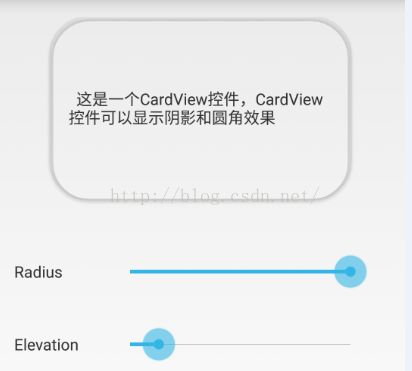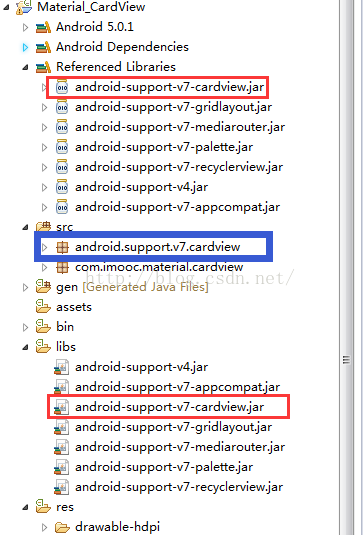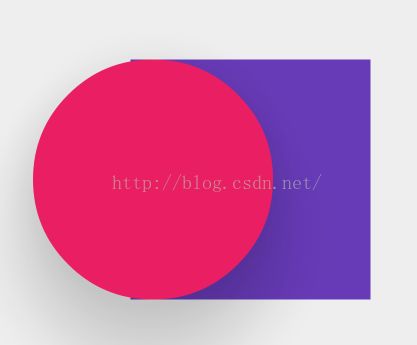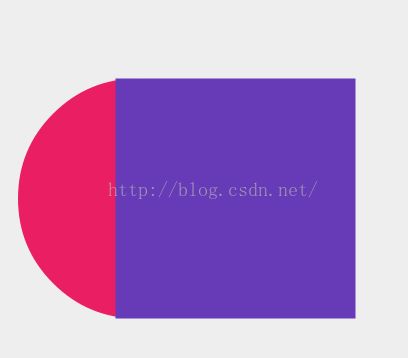Android5.x新特性之CardView立体卡片--阴影、圆角
苹果追求的是扁平化,安卓追求的是层次,立体,阴影化
安卓5.X新特性里面就有一个CardView可以实现该效果
测试工具:Nexus5 开发工具Es Sdk版本5.1.1
代码下载地址 点击打开链接------------
提示:demo无法在4.x的手机上运行,由于Nexus5我刷机是5.x的rom,所以可以跑起来,我初学,不知道原因是不是,这个控件只能适用于5.x的系统
将V7下的cardview.jar包放到项目中
接下来看项目框架--主要是将cardview.jar包导入到项目中
看上面截图的蓝色框里面需要加入cardview库下的代码--可以直接编译该库,然后将gen目录下的代码拷贝进来即可
activity_main.xml看代码的布局文件
<?xml version="1.0" encoding="utf-8"?>
<ScrollView xmlns:android="http://schemas.android.com/apk/res/android"
xmlns:card_view="http://schemas.android.com/apk/res-auto"
android:layout_width="match_parent"
android:layout_height="match_parent" >
<LinearLayout
android:layout_width="match_parent"
android:layout_height="match_parent"
android:orientation="vertical"
android:paddingBottom="16dp"
android:paddingLeft="16dp"
android:paddingRight="16dp"
android:paddingTop="16dp" >
<android.support.v7.widget.CardView
android:id="@+id/cardview"
android:layout_width="fill_parent"
android:layout_height="160dp"
android:layout_marginLeft="32dp"
android:layout_marginRight="32dp"
android:elevation="100dp"
card_view:cardBackgroundColor="#71C3DE"
card_view:cardCornerRadius="8dp" >
<TextView
android:layout_width="wrap_content"
android:layout_height="wrap_content"
android:layout_gravity="center"
android:layout_margin="16dp"
android:text=" 这是一个CardView控件,CardView控件可以显示阴影和圆角效果" />
</android.support.v7.widget.CardView>
<LinearLayout
android:layout_width="fill_parent"
android:layout_height="wrap_content"
android:layout_marginTop="32dp"
android:orientation="horizontal" >
<TextView
android:layout_width="70dp"
android:layout_height="wrap_content"
android:layout_gravity="center_vertical"
android:text="Radius" />
<SeekBar
android:id="@+id/cardview_radius_seekbar"
android:layout_width="fill_parent"
android:layout_height="wrap_content"
android:layout_margin="16dp" />
</LinearLayout>
<LinearLayout
android:layout_width="fill_parent"
android:layout_height="wrap_content"
android:orientation="horizontal" >
<TextView
android:layout_width="70dp"
android:layout_height="wrap_content"
android:layout_gravity="center_vertical"
android:text="Elevation" />
<SeekBar
android:id="@+id/cardview_elevation_seekbar"
android:layout_width="fill_parent"
android:layout_height="wrap_content"
android:layout_margin="16dp" />
</LinearLayout>
</LinearLayout>
</ScrollView>
styles.xml 上面布局中的card_view需要在style中进行设置
<declare-styleable name="CardView">
<attr name="cardBackgroundColor" format="color" />
<attr name="cardCornerRadius" format="dimension" />
</declare-styleable>
CardViewActivity
package com.imooc.material.cardview;
import android.app.Activity;
import android.os.Bundle;
import android.support.v7.widget.CardView;
import android.widget.SeekBar;
public class CardViewActivity extends Activity {
CardView mCardView;
SeekBar mRadiusSeekBar;
SeekBar mElevationSeekBar;
@Override
protected void onCreate(Bundle savedInstanceState) {
super.onCreate(savedInstanceState);
setContentView(R.layout.activity_main);
mCardView = (CardView) findViewById(R.id.cardview);
mRadiusSeekBar = (SeekBar) findViewById(R.id.cardview_radius_seekbar);
mRadiusSeekBar
.setOnSeekBarChangeListener(new SeekBar.OnSeekBarChangeListener() {
@Override
public void onStopTrackingTouch(SeekBar seekBar) {
}
@Override
public void onStartTrackingTouch(SeekBar seekBar) {
}
@Override
public void onProgressChanged(SeekBar seekBar,
int progress, boolean fromUser) {
mCardView.setRadius(progress);
}
});
mElevationSeekBar = (SeekBar) findViewById(R.id.cardview_elevation_seekbar);
mElevationSeekBar
.setOnSeekBarChangeListener(new SeekBar.OnSeekBarChangeListener() {
@Override
public void onStopTrackingTouch(SeekBar seekBar) {
}
@Override
public void onStartTrackingTouch(SeekBar seekBar) {
}
@Override
public void onProgressChanged(SeekBar seekBar,
int progress, boolean fromUser) {
mCardView.setElevation(progress);
}
});
}
}
——————————————————————案例效果2————————————————————————
点击打开链接,下载代码
activity_main.xml主布局就一个frameLayout
<LinearLayout xmlns:android="http://schemas.android.com/apk/res/android"
android:id="@+id/sample_main_layout"
android:layout_width="match_parent"
android:layout_height="match_parent"
android:orientation="vertical" >
<FrameLayout
android:id="@+id/sample_content_fragment"
android:layout_width="match_parent"
android:layout_height="0px"
android:layout_weight="2" />
</LinearLayout>
MainActivity主布局界面代码
package com.imooc.material_shadows;
import android.os.Bundle;
import android.support.v4.app.FragmentActivity;
import android.support.v4.app.FragmentTransaction;
public class MainActivity extends FragmentActivity {
@SuppressWarnings("null")
@Override
protected void onCreate(Bundle savedInstanceState) {
super.onCreate(savedInstanceState);
setContentView(R.layout.activity_main);
FragmentTransaction transaction = getSupportFragmentManager()
.beginTransaction();
ElevationBasicFragment fragment = new ElevationBasicFragment();
transaction.replace(R.id.sample_content_fragment, fragment);
transaction.commit();
}
}
看fragment布局elevation_basic.xml---只有叠放的2个图
<?xml version="1.0" encoding="utf-8"?>
<FrameLayout xmlns:android="http://schemas.android.com/apk/res/android"
xmlns:tools="http://schemas.android.com/tools"
android:layout_width="match_parent"
android:layout_height="match_parent">
<View
android:id="@+id/floating_shape"
android:layout_width="160dp"
android:layout_height="160dp"
android:layout_marginRight="40dp"
android:background="@drawable/shape"
android:elevation="50dp"
android:layout_gravity="center"/>
<View
android:id="@+id/floating_shape_2"
android:layout_width="160dp"
android:layout_height="160dp"
android:layout_marginLeft="25dp"
android:background="@drawable/shape2"
android:layout_gravity="center"/>
</FrameLayout>
圆shape.xml
<?xml version="1.0" encoding="utf-8"?>
<shape xmlns:android="http://schemas.android.com/apk/res/android"
android:shape="oval">
<solid android:color="#E91E63" />
</shape>
矩形shape2.xml
<?xml version="1.0" encoding="utf-8"?>
<shape xmlns:android="http://schemas.android.com/apk/res/android"
android:shape="rectangle">
<solid android:color="#673AB7" />
</shape>
ElevationBasicFragment
translationZ允许你创建一个动画暂时的反应出View的高度值(elevation)变化。
这对于响应触摸手势很有用处
package com.imooc.material_shadows;
import android.support.v4.app.Fragment;
import android.os.Bundle;
import android.view.LayoutInflater;
import android.view.MotionEvent;
import android.view.View;
import android.view.ViewGroup;
public class ElevationBasicFragment extends Fragment {
@Override
public View onCreateView(LayoutInflater inflater, ViewGroup container,
Bundle savedInstanceState) {
View rootView = inflater.inflate(R.layout.elevation_basic, container,
false);
//矩形
View shape2 = rootView.findViewById(R.id.floating_shape_2);
shape2.setOnTouchListener(new View.OnTouchListener() {
@Override
public boolean onTouch(View view, MotionEvent motionEvent) {
int action = motionEvent.getActionMasked();
switch (action) {
case MotionEvent.ACTION_DOWN:
view.setTranslationZ(40);
break;
case MotionEvent.ACTION_UP:
view.setTranslationZ(0);
break;
default:
return false;
}
return true;
}
});
return rootView;
}
}
在elevation_basic.xml布局中,由于圆形属性 android:elevation="50dp",使得其静态高度为50,结果圆在矩形之上
如果改成android:elevation="0dp"
那么就是这样的效果
按下的效果是带阴影的如图:



